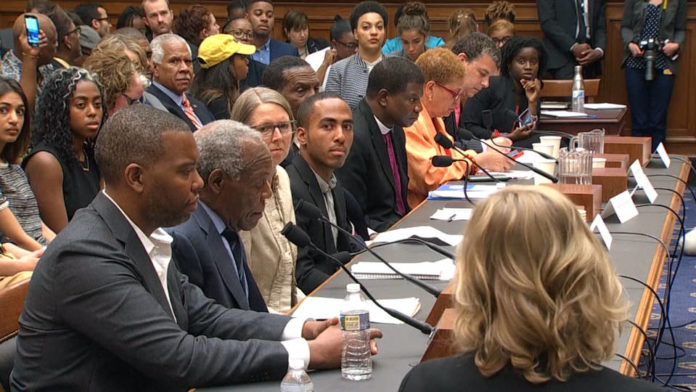With the House of Representatives looking into the possibility of paying reparations to the ancestors of antebellum slaves, there is a lot of talk about reparations in social media. One of my Facebook friends mentioned that if we start walking down the road of holding races responsible for what people of the same race did in centuries past, it cannot lead to anything positive. A friend of this friend replied, “It’s not that they are responsible, they just reap the lavish benefits.”
I was asked how I would respond, and what follows is my answer.
There was zero per capita GDP growth in the antebellum South, until after slavery was ended. The North, in the meantime, was exploding in per capita GDP growth from 1789 until 1913. After the Civil War, the South started to see rapid per capita GDP growth too, but by then the South was so far behind the North, that the South has STILL not caught up.
About one percent of the population owned slaves. Those were the ONLY people who benefitted. Slavery quite literally held everyone else back, as without per capita GDP growth, there was no wage growth either.
There was, of course, wage growth in the North, but even that was slowed down by slavery in the South, as the depressed wages in the South kept the South from consuming anywhere near as many Northern goods as they would have consumed had people had money.
Slaves had no money, and consumed very little. White people, other than the 1% who owned slaves, also generally had no money, and consumed very little. That lack of consumption translated into a lack of economic activity and suppressed economic growth.
The notion that white people benefitted lavishly from slavery is a lie.
Then there are the questions of who, today, has a residual benefit; who, today, has residual harm from slavery; and how you measure those things. That’s not an easy question to answer, either, given that many people in America, including virtually every black person with ancestors from the antebellum South, is of mixed race.
I also have to wonder where reparations end. Slavery obviously was a horrendous institution, but what about what happened to the Native Americans? How about the Japanese Americans who were interned in WWII? How about the Chinese working on the railroads, during the era when the trans-continental railroads were built? Do these groups not also deserve reparations of some kind?
If we wanted to be fair, with race-based reparations, we would not limit ourselves to slavery, but would pay reparations to everyone whose race was harmed by America’s past. We might pay some groups more than others, based on their ancestors being harmed more than other groups, but we would pay everyone whose race was in any way harmed by white Americans, in centuries past, and the justification is that white people still benefit from the harm inflicted on other races, in centuries past.
Reparations, then, are not about erasing slavery, but erasing privilege. In other words, white people will be asked to pay for the privilege we enjoy, living in a white country designed to benefit white people, from the ground up.
If this is a privilege payment, we should pay all POC, as well as all women, the entire LGBTQ++ community, fat people, ugly people, stupid people, and anyone else who can claim to be a victim of some element of society, or of some element of society’s past…
Furthermore, if wealth and income are the primary way to measure privilege, then we would have to redistribute wealth and income until those things are equal, across the board, making communism, rather than reparations, the solution to the sins of America’s past.
And why stop in the United States? Have we ever marginalized other nations, by choosing their leadership for them, fighting wars, choosing one trading partner over another, or by doing anything else that had a disparate economic impact on other nations? Do those people in those nations not all deserve reparations?

Maybe, before we go all in on a communist UN-based world, we should look at the question of whether or not ‘privilege’ exists, as described by the left, in American today. The facts below come from Thomas Sowell’s book, ‘White Liberals and Black Rednecks’.
Statistically speaking, new immigrants coming from developing nations tend to make less than Native-born Americans, but their grand children (third generation) have no statistical disparity. That’s true for people coming from all over the world, including from Africa, and including black people immigrating from the Caribbean. Additionally, the richest Americans are not white Americans, but are Asian Americans, and Indian Americans. Asian American and Indian American families do regress to the mean, but it takes a lot longer – about six generations. This would indicate that culture, and not racism, is what separates some people from others, in terms of economic outcomes (which is primarily how ‘privilege’ is measured), and that cultures that tend to increase wages (a dedication to education and a focus on engineering and science) tend to change more slowly than do cultural attributes that hold people back.
What is the culture of those who seek reparations? If rap music is any indication, much of that culture is not healthy…
If cultural elements are holding people back, we might look to see what drives those cultural elements. And the driving force their is the War on Poverty, as noted in this article (click link).
How ironic it is – and convenient – that the same political party that used the War on Poverty to make our inner cities dependent on government assistance, now wants to use reparations to accomplish more of the same goal, while still keep American Apartheid on the books!
Republicans, on the other hand, want to help dependent people become self-sufficient. Democrats pretend that this makes Republicans the party standing ‘against’ those groups, as making people independent also, by definition, removes the programs many in these groups have become dependent on. Democrats sell dependency as the only possible solution to poverty, and then call anyone who wants to help people become independent, every bad word in the book.
There is an old saying that truly illustrates the difference between conservative and liberal policies regarding poverty: “If you give a man a fish, he eats for a day, but if you teach a man to fish, he eats for a lifetime.”
Liberals want a society in which everyone, but the elite, lines up for fish every day. Liberals literally get their political power by being the group that doles out fish to the starving masses.
Conservatives may be OK giving starving people fish (and if you offer a hungry person a choice between a fish and a fishing pole, they’ll generally take the fish), but we also want to teach people to fish, such that in the future, they can live better lives.
It’s no secret that the poorer people are, the more apt they are to vote Democrat, whereas the more wealthy people become, the more apt they are to vote Republican. Democrats have everything to gain by keeping people poor, and by making more people poor. Republicans can only grow in power by making it easier for people to rise into higher income levels. Remember that when you look at the difference between conservative, and liberal, policy prescriptions.
Another way to look at this difference is to see that conservatives want to eliminate poverty, whereas liberals want to make poverty more comfortable to live under – and want to put more people into poverty. This concept is discussed in more detail in the article, Democrats, Republicans, and Hate for the Poor.
There are some programs that Republicans can get behind, when it comes to helping marginalized groups. One would be to replace the minimum wage, and welfare programs, with Milton Friedman’s Negative Income Tax (outlined here). Another might be to improve the quality of education in our inner cites, such as through school voucher programs, and school choice systems.
Whatever the case, reparations solve nothing, and the idea of paying them must be rejected.





















